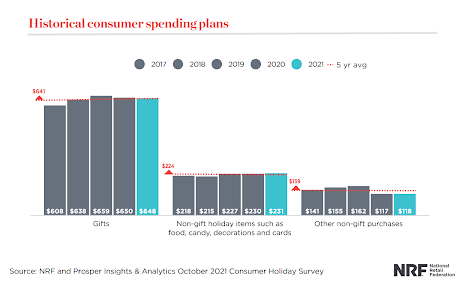
The Facts Behind the Holiday Rush
The National Retail Federation (NRF), a private collaborative of retailers that conducts research and advocates for retailer interests, recently published its annual survey on holiday spending. According to the survey, about 90% of US consumers plan to celebrate a holiday over the winter months. What's more, the data indicate that shoppers plan on spending roughly $1000 on gifts and other items.

These figures may be surprising, especially with all the headlines about supply chain issues. What's less surprising is that these issues have prompted people to start shopping earlier. "Half (49%) of holiday shoppers will start browsing and buying before November, up from 42 percent in 2020 and the highest in the survey's history."
All the hubbub about holiday shopping induces different reactions from different people. Some may cradle their heads from the stress headache that shopping for their families can cause. Others may roll their eyes at the ostensible materialism of it all. Yet, it's important for business owners to have a proper understanding of the realities behind the holiday season and what they need to do to make the best of it.
Let's take a look at some of the facts behind the holiday rush and think about the best ways to take advantage of it, in spite of the circumstances.
The Significance of Holiday Business
The NRF's data suggests that retailers, both online and offline, generated about 19% of their revenue from sales in November and December. In addition, Statista, an independent statistical research group, predicts that total revenue from holiday shopping will fall somewhere between $843.4 billion and $859 billion. This puts their own estimates of total annual shopping revenue, which was $5.6 trillion in 2020, at about 15%. In other words, nearly a fifth of all retail sales occurs in November and December during the holidays.
With all this money going into retailers' pockets, many may wonder if they're being taken for a ride. Are all the holiday sales actually good deals, or is it an illusion created by clever advertisers?
The short answer is… it depends. Some products, like electronics, are at their most discounted during the holiday season and immediately after it. Other products, like clothes, are more discounted during the summer months when the fashion season wraps up. Nathan Burrow, writing for the New York Times, points out that many so-called "sales" are actually a tactic to get people to spend more money, as simply advertising things at a low price doesn't get people excited about spending. As such, consumers should always do their research when timing their shopping habits.
In any case, many businesses frame their holiday business tactics as a response to consumer demand. NRF CEO Matthew Shay puts it this way: "Every year retailers plan their seasonal inventory, staffing, and product promotions well in advance for the busy holiday season. Consumers are ready to celebrate, and gift-giving is high on the list."
Taking Advantage of the Holidays
Retailers pull out all the stops to meet the holiday demand. As mentioned above, this includes stocking inventories, hiring temporary staff, and running sales promotions. Whatever your feelings about the holiday shopping season, if you're in retail, you're shooting yourself in the foot if you don't move to take advantage of this upswing in demand.
With the pandemic, however, there are some things to keep in mind. E-commerce is continuing to grow during the time of social distancing. According to Statista, e-commerce accounted for 15% of all holiday retail sales, and those figures are likely to increase this year. That means that selling over the internet is a must for any contemporary retailer.
The NRF's survey indicates that 47% of consumers are worried about getting their gifts on time due to disruptions in the supply chain. Even though there are likely to be hiccups, experts interviewed in this article from Business Insider say not to panic. They recommend consumers shop early, shop local, and shop in person as delays in shipping may prevent the timely arrival of items purchased online.
As for businesses, large mass-market retailers are taking action to ensure their inventories are ready for the holidays, according to this report from ABC. Such actions include rerouting cargo ships to smaller, less congested ports; switching to air freight; extending their hours; and bringing in extra staff.
Smaller businesses may not have the resources to employ these tactics, unfortunately. They will need to take a more refined and focused strategy to ensure profitability. If you need someone in your corner to help you navigate this holiday season, shoot us a line using the request button below.
**Quick Announcements**
-The American Red Cross has a donation drive for the victims of the recent tornadoes that struck the Midwest. If you'd like to donate, click here.
-Web and Marketing USA will be closed from December 20th to January 2nd in observance of the holiday season. We'll see you next year!

